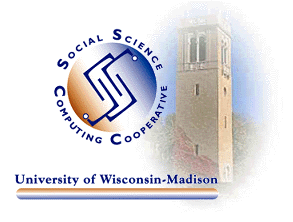
WinCenter Expansion
SSCC Fall Training Schedule
Town Meeting October 2nd at 12:20
New SSCC Web Site and Search Engine
New/Revised SSCC Publications
How SSCC's Mail Server Filters Out Viruses
Renewal Information on SPSS for PC Licenses
Two additional terminal servers, WinStat1 and WinStat2, are now available for WinCenter users. These new servers give users a much needed increase in CPU cycles and will provide an ideal environment for running computer intensive statistical programs in a Windows environment. With the addition of these two new terminal servers, we can now accommodate an additional 30 simultaneous users (15 on each).
You can access WinStat1 and WinStat2 the same way you do WinCenter1 and WinCenter2: from a WinTerm, from a PC using the Citrix ICA client (link to related documentation), from Internet Explorer at http://ntweb.ssc.wisc.edu/tsweb, or from UNIX by typing winstat1 or winstat2 at the command prompt.
With the addition of these two new servers, we can now begin to segregate application traffic by moving all the statistical software to the new servers. WinCenter1 and WinCenter2 can then be used primarily for office applications and DreamWeaver (web editing software.) We plan to remove statistical applications from WinCenter1 and WinCenter2 in the next week or so. This should significantly improve performance for all terminal server users. Note that all four terminal servers will have Microsoft Office installed and that you can copy/paste between sessions.
We are still working out a few kinks but most of these should be taken care of once we get WinCenter1 and WinCenter2 upgraded to Windows 2000 later this semester. If you have any problems, please report them to consultant.
There will be an SSCC Town Meeting on October 2nd at 12:20 in Social Science 8417. SSCC staff bring two main agenda items to be discussed:
There will be plenty of opportunity for discussion and questions about these items or any other issues you would like to raise.
As you may have already noticed, the SSCC's web site has been revised and expanded. One major goal was to make the SSCC Publication collection more valuable by making it easier to find the information you need. The SSCC Publications page is now organized by topic, and we have added a Search Engine that can search the entire SSCC site (though not members' sites), or just the Publications. The SSCC Publication collection contains a great deal of information, and with these additions it will be quick and easy to find the answers to many of your computer questions on the SSCC web site.
We are in the process of updating and adding to our collection on PC publications. Below are this month's additions:
There are a number of viruses, happy99 and PrettyPark for example, which spread by sending a particular file. Since this file always has the same name, it is easy to recognize and remove from an email message. SSCC's mail server removes these known viruses from all email that comes into SSCC, or that goes out through our server. The sender receives an automated message informing him/her of the virus, as well.
In addition to this, all files with two "."s in the name (for example, file.doc.exe) are being filtered. This is because a number of viruses masquerade as innocent file types, knowing that on many computers the second ending won't be displayed. Stopping these files at the server prevents viruses from ever reaching the PC, so it can't be activated.
One example that illustrates the benefit of this is the current variant of the Magistr virus. The virus is widely distributed, and can be quite destructive. For the first two days that this virus existed, anti-virus software was unable to detect it. This meant that PCs were vulnerable to this virus. However, SSCC's mail server acts as another line of defense. Infected files have random names, but one of 4 endings. All files with those endings were defanged, so you had to make an effort to open the file. This prevents casual spread of the virus.
You have probably received an attachment that has been defanged. All this means is that the name has been changed so that you can not just click on the file and run a program. The file itself is intact, and will behave normally if it is renamed. To rename a file, go to where it has been downloaded, and right-click on the file name. Choose the rename option, and remove "defanged#####-" from the file name. You should then be able to open the file as usual, and the icon should change to indicate the file type. You can also open the file without renaming it, by starting the associated program first and then opening the file from within the program.
There is one other complicating aspect to this, which involves an unusual programming choice in Eudora. You can not double-click on a defanged file and open it. If you're using Eudora to read mail from an IMAP account, this means that the attachment doesn't get saved into the designated directory. This can be particularly annoying because Eudora creates a 2 kb file with the same name as the attachment, that is essentially a placeholder and not the attachment itself. In version 5 of Eudora, you can right-click and save the attachment under any name and in any location you wish. In version 4, the only remedy is to set Eudora to download the entire message, not minimal headers only.
Go to previous editions of
SSCC News .
Go to the SSCC Home Page.
© 2001 University of Wisconsin Social Science Computing Cooperative